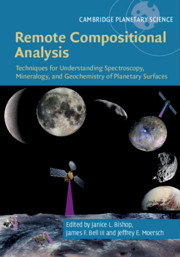 Remote Compositional Analysis
Remote Compositional Analysis Book contents
- Remote Compositional Analysis
- Cambridge Planetary Science
- Remote Compositional Analysis
- Copyright page
- Contents
- Contributors
- Foreword
- Preface
- Acknowledgments
- Part I Theory of Remote Compositional Analysis Techniques and Laboratory Measurements
- 1 Electronic Spectra of Minerals in the Visible and Near-Infrared Regions
- 2 Theory of Reflectance and Emittance Spectroscopy of Geologic Materials in the Visible and Infrared Regions
- 3 Mid-infrared (Thermal) Emission and Reflectance Spectroscopy
- 4 Visible and Near-Infrared Reflectance Spectroscopy
- 5 Spectroscopy of Ices, Volatiles, and Organics in the Visible and Infrared Regions
- 6 Raman Spectroscopy
- 7 Mössbauer Spectroscopy
- 8 Laser-Induced Breakdown Spectroscopy
- 9 Neutron, Gamma-Ray, and X-Ray Spectroscopy
- 10 Radar Remote Sensing
- Part II Terrestrial Field and Airborne Applications
- Part III Analysis Methods
- Part IV Applications to Planetary Surfaces
- Index
- References
8 - Laser-Induced Breakdown Spectroscopy
Theory and Laboratory Spectra of Geologic Materials
from Part I - Theory of Remote Compositional Analysis Techniques and Laboratory Measurements
Published online by Cambridge University Press: 15 November 2019
- Remote Compositional Analysis
- Cambridge Planetary Science
- Remote Compositional Analysis
- Copyright page
- Contents
- Contributors
- Foreword
- Preface
- Acknowledgments
- Part I Theory of Remote Compositional Analysis Techniques and Laboratory Measurements
- 1 Electronic Spectra of Minerals in the Visible and Near-Infrared Regions
- 2 Theory of Reflectance and Emittance Spectroscopy of Geologic Materials in the Visible and Infrared Regions
- 3 Mid-infrared (Thermal) Emission and Reflectance Spectroscopy
- 4 Visible and Near-Infrared Reflectance Spectroscopy
- 5 Spectroscopy of Ices, Volatiles, and Organics in the Visible and Infrared Regions
- 6 Raman Spectroscopy
- 7 Mössbauer Spectroscopy
- 8 Laser-Induced Breakdown Spectroscopy
- 9 Neutron, Gamma-Ray, and X-Ray Spectroscopy
- 10 Radar Remote Sensing
- Part II Terrestrial Field and Airborne Applications
- Part III Analysis Methods
- Part IV Applications to Planetary Surfaces
- Index
- References
Summary
Laser-Induced Breakdown Spectroscopy (LIBS) is the remote elemental analysis technique used by the ChemCam instrument on the Curiosity rover. LIBS involves remotely ablating material from rocks and soils with a focused high-energy laser, which generates an optically excited plasma from which the elements in the rock or soil sample are quantitatively determined. The LIBS technique offers many advantages for remote chemical analysis. LIBS provides very rapid analyses without the need for any sample preparation. LIBS is capable of detecting all elements present above the detection limits independent of the atomic mass. LIBS quantitative analysis continues to evolve and produce accurate compositions with decreasing uncertainties. Furthermore, the matrix effects that tend to complicate most elemental analysis techniques like LIBS are increasingly exploited to extract more sample details. The focus of this chapter is to describe the current state of LIBS chemical analysis for remote planetary science.
Keywords
Information
- Type
- Chapter
- Information
- Remote Compositional AnalysisTechniques for Understanding Spectroscopy, Mineralogy, and Geochemistry of Planetary Surfaces, pp. 168 - 190Publisher: Cambridge University PressPrint publication year: 2019
References
Accessibility standard: Unknown
Why this information is here
This section outlines the accessibility features of this content - including support for screen readers, full keyboard navigation and high-contrast display options. This may not be relevant for you.Accessibility Information
- 1
- Cited by